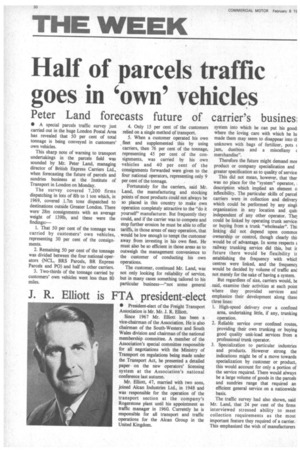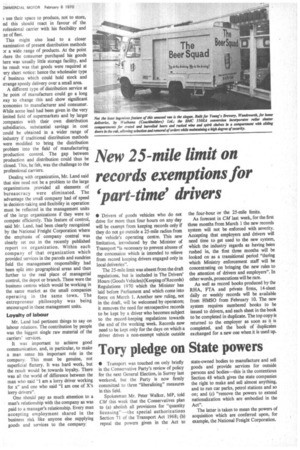Half of parcels traffic goes in 'own' vehicles
Page 32

Page 33

If you've noticed an error in this article please click here to report it so we can fix it.
Peter Land forecasts future of carrier's busines
• A special parcels traffic survey just carried out in the huge London Postal Area has revealed that 50 per cent of total tonnage is being conveyed in customers' own vehicles.
This sharp note of warning to transport undertakings in the parcels field was sounded by Mr. Peter Land, managing director of British Express Carriers Ltd., when forecasting the future of parcels and sundries business at the Institute of Transport in London on Monday.
The survey covered 7,200 firms dispatching in lots of 81b to 1 ton which, in 1969, covered 1.7m tons dispatched to destinations outside Greater London. There were 28m consignments with an average weight of 1391b, and these were the findings:
1. That 50 per cent of the tonnage was carried by customers' own vehicles, representing 30 per cent of the consignments.
2. Remaining 50 per cent of the tonnage was divided between the four national operators (NCL, BRS Parcels, BR Express Parcels and PO) and half to other carriers.
3. Two-thirds of the tonnage carried by customers' own vehicles went less than 80 miles. 4. Only 15 per cent of the customers relied on a single method of transport.
5. When a customer operated his own fleet and supplemented this by using carriers, then 76 per cent of the tonnage, representing 45 per cent of the consignments, was carried by his own vehicles and 40 per cent of the consignments forwarded were given to the four national operators, representing only 9 per cent of the tonnage.
Fortunately for the carriers, said Mr. Land, the manufacturing and stocking points of most products could not always be so placed in this country to make own operation completely attractive to the "do it yourself" manufacturer. But frequently they could, and if the carrier was to compete and stop further erosion he must be able to offer tariffs, in those areas of easy operation, that would be low enough to tempt the customer away from investing in his own fleet. He must also be so efficient in those areas as to outweigh the management convenience to the customer of conducting his own operations.
The customer, continued Mr. Land, was not only looking for reliability of service, but in many cases something tailored to his particular business—"not some general system into which he can put his good where the loving care with which he lu made them may seem to disappear into tf unknown with bags of fertilizer, pots c jam, dustbins and a miscellany merchandise".
Therefore the future might demand mor product or company specialization and greater specification as to quality of service This did not mean, however, that ther was no place for the "system" operator, description which implied an element o inflexibility. The particular skills of parcel carriers were in collection and delivery which could be performed by any sing organization in any location and quit+ independent of any other operator. The could be linked by operating trunk service, or buying from a trunk "wholesaler". Thi linking did not depend upon commot ownership or control, though clearly thi; would be of advantage. In some respects z railway trunking service did this, but it future there would be flexibility ir establishing the frequency with whicf centres were linked, and the frequency would be decided by volume of traffic anc not merely for the sake of having a system.
But regardless of size, carriers would, he . said, examine their activities at each point where they provided services and emphasize their development along thesc three lines: 1. High-speed delivery over a confined area, undertaking little, if any, trunking operation.
2. Reliable service over confined routes, providing their own trunking or buying good quality unit-load services from a professional trunk operator.
3. Specialization to particular industries and products. However strong the indications might be of a move towards specialization by customer or product, this would account for only a portion of the service required. There would always be a large volume of goods in the parcels and sundries range that required an efficient general service on a nationwide basis.
The traffic survey had also shown, said Mr. Land, that 24 per cent of the firms interviewed stressed ability to meet collection requirements as the most important feature they required of a carrier. This emphasized the wish of manufacturers use their space to produce, not to store, ad this should react in favour of the rofessional carrier with his flexibility and .ze of fleet.
This might also lead to a closer xamination of present distribution methods 3r a wide range of products. At the point /here the consumer purchased his goods here was usually little storage facility, and he result was that goods were required at 'cry short notice: hence the wholesaler type if business which could hold stock and trrange speedy delivery over a small area A different type of distribution service at he point of manufacture could go a long way to change this and show significant xonomies to manufacturer and consumer. While some lead had been given in the very limited field of supermarkets and by larger ompanies with their own distribution subsidiaries, substantial savings in cost could be obtained in a wider range of industry if traditional distribution methods were modified to bring the distribution problem into the field of manufacturing production control. The gap between production and distribution could thus be closed. This, he felt, was the challenge to the professional carriers.
Dealing with organization, Mr. Land said that size need not be a problem to the large organizations provided all elements of bureaucracy were eliminated. The advantage the small company had of speed in decision-taking and flexibility in operation must be reflected in the management units of the large organizations if they were to compete efficiently. This feature of control, said Mr. Land, had been clearly recognized by the National Freight Corporation where the emphasis of company control was clearly set out in the recently published report on organization. Within each company of that organization which provided services in the parcels and sundries field the management responsibility had been split into geographical areas and then further to the real place of managerial control, the depot or branch. These were the business centres which would be working in the same market as the small companies operating in the same town. The entrepreneur philosophy was being encouraged in these management units.
Loyalty of labour
Mr. Land had pertinent things to say on labour relations. The contribution by people was the biggest single raw material of the carriers' services.
It was important to achieve good communication, and, in particular, to make a man sense his important role in the company. This must be genuine, not superficial flattery. It was hard work, but the result would be towards loyalty. There was all the world of difference between the man who said "I am a lorry driver working for x" and one who said "I am one of X's lorry drivers".
One should pay as much attention to a man's relationship with the company as was paid to a manager's relationship. Every man accepting employment shared in the business risk like anyone else supplying goods and services to the company.


















































































































































